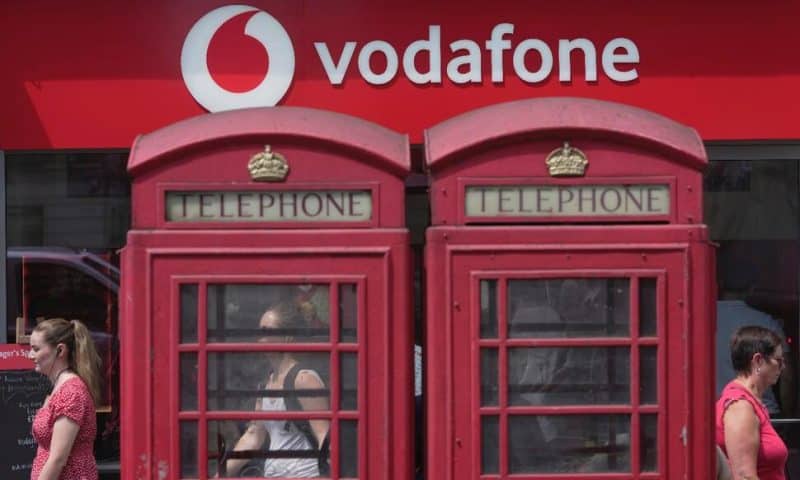Two of the U.K.’s biggest mobile phone operators have agreed to merge their businesses to capitalize on the rollout of next-generation 5G wireless technology in the country
LONDON — Two of the U.K.’s four mobile phone operators agreed Wednesday to merge their businesses to capitalize on the rollout of next-generation 5G wireless technology in the country.
The tie-up of Vodafone U.K. and Three U.K., which is owned by Hong Kong’s CK Hutchison, would create Britain’s biggest mobile phone player, with a combined 27 million customers. But the deal is likely to face stiff regulatory scrutiny because it will reduce the number of mobile networks down to three.
Vodafone will account for 51% of the merged firm, with CK Hutchison owning the rest. Vodafone will have an option to buy out CK Hutchison’s stake after three years should the combined entity have a value of at least 16.5 billion pounds ($21 billion).
The groups said the merger will help them compete with their rivals on 5G technology, which provides much faster connectivity and greater capacity that will potentially allow thousands of devices to be connected at the same time within a relatively small area.
Vodafone CEO Margherita Della Valle described the deal as a “game-changer” for the company’s home market.
“It’s transformative as it will create a best-in-class — indeed best-in-Europe — 5G network, offering customers a superior experience,” she said.
Canning Fok, group co-managing director of C.K. Hutchison, said Three U.K. and Vodafone U.K. individually lack the necessary financial muscle for what’s needed.
“This has long been a challenge for Three U.K.’s ability to invest and compete,” he said.
The companies said they are aiming to complete the deal by the end of 2024.
If it gets the go-ahead from regulators, Vodafone U.K. boss Ahmed Essam will be chief executive, with Three U.K. chief financial officer Darren Purkis taking on that role at the merged company.
It expects cost savings of more than 700 million pounds within five years of the deal’s completion, through measures such as merging IT systems; combining marketing, sales, distribution and logistics activities; and general cost-cutting. The firms said it was too early to put a figure on the number of jobs that would be affected.
Unite, Britain’s largest trade union, urged the government to “step in and stop this reckless merger,” arguing it would lead to job losses and push up prices for customers.
The deal comes a month after Vodafone announced that it was laying off 11,000 workers globally as part of a major revamp aimed at cutting costs and boosting flagging financial performance.
Vodafone U.K. and Three U.K. pledged to invest 11 billion pounds in Britain over the next 10 years to create one of Europe’s biggest 5G networks, promising that every school and hospital in the country will have access to standalone 5G by 2030.
Given that the deal would reduce the number of mobile operators in the U.K. — EE and O2 being the other two — it will be scrutinized closely by the Competition and Markets Authority. Other smaller firms, such as Sky and Tesco, piggyback on the big four’s networks.
Rocio Concha, director of policy and advocacy and consumer champion publication Which?, said the deal will require a thorough assessment from the regulator to ensure it is not harmful to consumers.
“A good mobile connection is essential to everyday modern life, and this merger between Vodafone and Three will have a significant impact on the telecoms market,” she said.
“Reducing the number of network providers from four to three risks reducing the choices available to consumers, raising prices and lowering the quality of services available,” she added.

